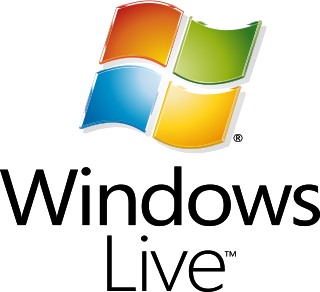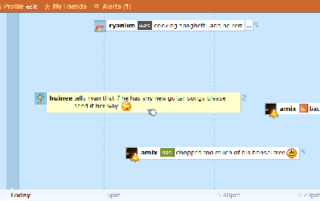
WordStar is a word processor application for microcomputers. It was published by MicroPro International and originally written for the CP/M-80 operating system, and later written also for MS-DOS and other 16-bit PC OSes. Rob Barnaby was the sole author of the early versions of the program.
Computer accessibility refers to the accessibility of a computer system to all people, regardless of disability type or severity of impairment. The term accessibility is most often used in reference to specialized hardware or software, or a combination of both, designed to enable the use of a computer by a person with a disability or impairment. Computer accessibility often has direct positive effects on people with disabilities.

In computing, text-based user interfaces (TUI), is a retronym describing a type of user interface (UI) common as an early form of human–computer interaction, before the advent of modern conventional graphical user interfaces (GUIs). Like GUIs, they may use the entire screen area and accept mouse and other inputs. They may also use color and often structure the display using special graphical characters such as ┌ and ╣, referred to in Unicode as the "box drawing" set. The modern context of use is usually a terminal emulator.
Attachmate Corporation is a 1982-founded software company which focused on secure terminal emulation, legacy integration, and managed file transfer software. Citrix-compatibility and Attachment Reflection were enhanced/added offerings.

xterm is the standard terminal emulator for the X Window System. It allows users to run programs which require a command-line interface.

Multiuser DOS is a real-time multi-user multi-tasking operating system for IBM PC-compatible microcomputers.
Windows Presentation Foundation (WPF) is a free and open-source graphical subsystem originally developed by Microsoft for rendering user interfaces in Windows-based applications. WPF, previously known as "Avalon", was initially released as part of .NET Framework 3.0 in 2006. WPF uses DirectX and attempts to provide a consistent programming model for building applications. It separates the user interface from business logic, and resembles similar XML-oriented object models, such as those implemented in XUL and SVG.

Windows Live is a discontinued brand name for a set of web services and software products developed by Microsoft as part of its software-as-a-service platform. Chief components under the brand name included web services, several computer programs that interact with the services, and specialized web services for mobile devices.

Alpha Microsystems, Inc., often shortened to Alpha Micro, was an American computer company founded in California in 1977. The company was founded in 1977 in Costa Mesa, California, by John French, Dick Wilcox and Bob Hitchcock. During the dot-com boom, the company changed its name to AlphaServ, then NQL Inc., reflecting its pivot toward being a provider of Internet software. However, the company soon reverted to its original Alpha Microsystems name after the dot-com bubble burst.
Mobile app development is the act or process by which a mobile app is developed for one or more mobile devices, which can include personal digital assistants (PDA), enterprise digital assistants (EDA), or mobile phones. Such software applications are specifically designed to run on mobile devices, taking numerous hardware constraints into consideration. Common constraints include CPU architecture and speeds, available memory (RAM), limited data storage capacities, and considerable variation in displays and input methods. These applications can be pre-installed on phones during manufacturing or delivered as web applications, using server-side or client-side processing to provide an "application-like" experience within a web browser.

Clip Studio Paint, informally known in Japan as Kurisuta (クリスタ), is a family of software applications developed by Japanese graphics software company Celsys. It is used for the digital creation of comics, general illustration, and 2D animation. The software is available in versions for macOS, Windows, iOS, iPadOS, Android, and ChromeOS.

Oracle VM VirtualBox is a type-2 hypervisor for x86 virtualization developed by Oracle Corporation. VirtualBox was originally created by InnoTek Systemberatung GmbH, which was acquired by Sun Microsystems in 2008, which was in turn acquired by Oracle in 2010.
A mobile operating system is an operating system for smartphones, tablets, smartwatches, smartglasses, or other non-laptop personal mobile computing devices. While computers such as typical laptops are "mobile", the operating systems used on them are generally not considered mobile ones, as they were originally designed for desktop computers that historically did not have or need specific mobile features. This line distinguishing mobile and other forms has become blurred in recent years, due to the fact that newer devices have become smaller and more mobile unlike hardware of the past. Key notabilities blurring this line are the introduction of tablet computers and light-weight laptops and the hybridization of the two in 2-in-1 PCs.
Remote Desktop Services (RDS), known as Terminal Services in Windows Server 2008 and earlier, is one of the components of Microsoft Windows that allow a user to initiate and control an interactive session on a remote computer or virtual machine over a network connection. RDS was first released in 1998 as Terminal Server in Windows NT 4.0 Terminal Server Edition, a stand-alone edition of Windows NT 4.0 Server that allowed users to log in remotely. Starting with Windows 2000, it was integrated under the name of Terminal Services as an optional component in the server editions of the Windows NT family of operating systems, receiving updates and improvements with each version of Windows. Terminal Services were then renamed to Remote Desktop Services with Windows Server 2008 R2 in 2009.

Plurk is a free social networking and micro-blogging service that allows users to send updates through short messages or links, which can be up to 360 text characters in length.
NetManage Inc. was a software company based in Cupertino, California, founded in 1990 by Zvi Alon, an Israeli engineer. The company's development centre was located at the MATAM technology park, in Haifa, Israel. In June 2008 the company was acquired by Micro Focus International, a British company based in Newbury, Berkshire.

The .NET Framework is a proprietary software framework developed by Microsoft that runs primarily on Microsoft Windows. It was the predominant implementation of the Common Language Infrastructure (CLI) until being superseded by the cross-platform .NET project. It includes a large class library called Framework Class Library (FCL) and provides language interoperability across several programming languages. Programs written for .NET Framework execute in a software environment named the Common Language Runtime (CLR). The CLR is an application virtual machine that provides services such as security, memory management, and exception handling. As such, computer code written using .NET Framework is called "managed code". FCL and CLR together constitute the .NET Framework.
A mobile application or app is a computer program or software application designed to run on a mobile device such as a phone, tablet, or watch. Mobile applications often stand in contrast to desktop applications which are designed to run on desktop computers, and web applications which run in mobile web browsers rather than directly on the mobile device.

μTorrent, or uTorrent is a proprietary adware BitTorrent client owned and developed by Rainberry, Inc. The "μ" in its name comes from the SI prefix "micro-", referring to the program's small memory footprint: the program was designed to use minimal computer resources while offering functionality comparable to larger BitTorrent clients such as Vuze or BitComet. μTorrent became controversial in 2015 when many users unknowingly accepted a default option during installation which also installed a cryptocurrency miner.










